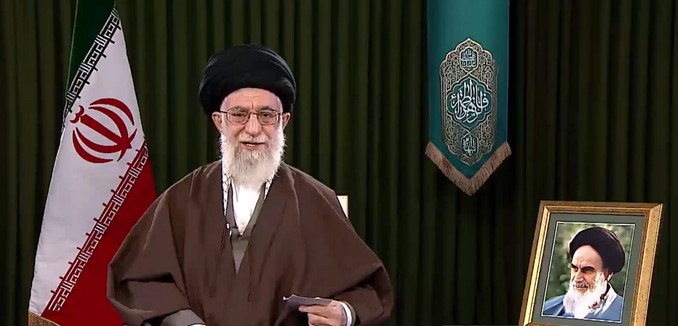Iran’s Supreme Leader Ayatollah Ali Khamenei warned on Sunday that gender equality is a “Zionist plot” to corrupt the role of women in society.
“Making women a commodity and an object of gratification in the Western world is most likely among Zionist plots aiming to destroy the society,” Khamenei said in a speech to Islamic preachers, according to his official English-language website. “Today, Western thinkers and those who pursue issues such as gender equality regret the corruption which it has brought about.”
Designating women as goods & means of pleasure in western world, most probably, is among Zionists’ plots to destroy human community.
— Khamenei.ir (@khamenei_ir) March 19, 2017
Khamenei made the remarks at a commemoration of the birth of Fatimah, the daughter of the Prophet Muhammad. Fatimah married the Imam Ali, founder of the Shia branch of Islam propagated by Iran, and is considered a role model for Muslim women, according to Khamenei’s website.
While Khamenei asserted that men and women are equal with regards to their “ascendance of spiritual positions, the power of leadership, and the capability to lead humankind,” women in Iran are subject to laws and norms that prevent their full participation in public life.
Iranian women face restrictions in academia and the workplace, and are forced to wear head coverings when appearing in public. Iran also is a Tier 3 country for its tolerance of human trafficking, according to the most recent U.S. State Department report, which noted that “Iranian girls between the ages of 13 and 17 are targeted by traffickers for sale abroad; younger girls may be forced into domestic service until their traffickers consider them old enough to be subjected to child sex trafficking.”
Last year, Khamenei issued a fatwa banning females from riding bicycles because the activity ostensibly endangers their “chastity” and “exposes society to corruption.”
In October 2015, two Iranian poets were sentenced to 99 lashes apiece and jail time for shaking hands with members of the opposite sex. A month earlier, the captain of Iran’s female soccer team could not compete abroad because her husband confiscated her passport.
On June 2014, a British-Iranian dual citizen was jailed for trying to watch a men-only volleyball match. After an Iranian cleric said last year that allowing women to watch sporting events in stadiums would “promote prostitution,” Iran barred women from attending a volleyball game between its national team and that of the United States.
In May 2014, Iranian actress Leila Hatami was forced to apologize after being threatened with lashes for kissing the president of the Cannes Film Festival on the cheek. In November 2015, actress Sadaf Taherian fled to Dubai after being declared “immoral” by authorities in Iran for posting pictures of herself to social media with her hair uncovered.
Flashback: 1979 anti-hijab rally in Tehran, Iran, a day before theocratic regime forcibly and violently began imposing veil on women pic.twitter.com/IzSPSVjIqA
— Borzou Daragahi (@borzou) March 19, 2017
According to the creators of an app designed to help Iranians avoid their country’s morality police, nearly three million people were given official warnings and 18,000 more were prosecuted in 2014 alone. The morality police are especially capricious towards women: Haaretz reported in February that more than 40,000 cars have been confiscated in Iran because their drivers violated the law on wearing a hijab. Women who are deemed to be wearing too much makeup or even walking with a man have been stopped, detained, and sometimes prosecuted.
Nazí Paikidze-Barnes, an American chess champion, has announced that she will not participate in an international chess tournament in Iran this year because she refuses to be forced to wear a hijab. Earlier this year, Iran expelled a female chess grandmaster from its national team after she competed in a tournament with her hair uncovered.
[Photo: Khamenei.ir ]




